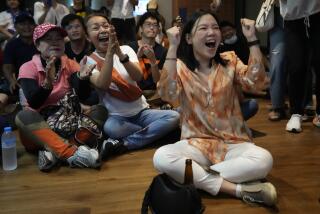Opposition Figures Win 35 of 50 Kuwaiti Seats : Mideast: Leftist intellectuals, religious fundamentalists make a strong showing in parliamentary election.
- Share via
KUWAIT CITY — On Monday, as the polls were about to close at Al Hassan Ibn al Haitham High School, Khalid Adwa, a 32-year-old firebrand Islamic priest, strode out to the school’s courtyard. Within seconds, scores of voters and campaign workers left their posts. They fell in behind the imam, dropped to their knees and joined the charismatic clergyman in evening prayers.
On Tuesday, Adwa, whose sermons were so critical of the Kuwaiti government that it banned him from the mosques earlier this year, was declared a landslide winner in the new 50-man National Assembly that now will try to guide Kuwait through uncertain democratic waters.
The election results, announced Tuesday, revealed an unprecedented show of strength by Kuwait’s diverse opposition, giving it a solid parliamentary majority of at least 35 seats. They will be divided almost equally between secular leftist intellectuals and fundamentalist religious figures who have vowed to use their new positions of power to work for broad changes in Kuwait’s social and political fabric.
The U.S. government, which had pressured Kuwait’s ruling royal family to hold the parliamentary elections after the Persian Gulf War liberated the emirate from Iraqi occupation, tried to put the best possible spin on the outcome.
“What happened here today was critical for establishing participatory democracy in Kuwait,” U.S. Ambassador Edward W. Gnehm Jr. said in an impromptu statement. “We felt the government did very well managing the election without interference in the election process itself.”
Kuwaiti analysts and other diplomatic sources gave a positive prognosis for democracy’s future in the oil-rich sheikdom, where the ruling family in 1986 dissolved an opposition-minded Parliament.
Experts took pains to stress that the powerful new group of religious assemblymen swept into power in this week’s election will not pose a threat to Western interests in a nation that remains deeply grateful for the allied war of liberation.
“The Islamic groups are stronger now than they were in the last Parliament, but they’re not large enough to dominate,” said a Western diplomat, who stressed that many winning candidates who were endorsed by religious political groups are, in fact, secular leftists.
“The issue that brought these two groups together is they wanted to have a Parliament that has checks and balances and curbs on the power of the royal family,” the diplomat said. “And now it’s the attitude of the family to Parliament that is going to determine whether it’s going to be ripping or gripping.”
Several diplomats stressed that Kuwaiti fundamentalists--most from wealthy, established families with wide exposure to Western culture--are far more moderate than religious conservatives elected but later denied power in Algeria in a similar experiment with democracy and Islam last year.
Throughout the election, the Islamic candidates, and the independents who won with the backing of the Islamic groups, stressed that their approach to change is gradual. But most of them consistently vowed to work toward replacing Kuwait’s Western penal system with a strict Sharia code of Islamic law, maintaining the emirate’s ban on women voting or seeking elective office and making Kuwaiti society more devout.
During one of the thousands of diwaniya election gatherings in private homes last week, Ismail Shatti, one of Kuwait’s new Islamic political leaders, illustrated the Muslims’ approach during a talk with 17 prospective voters.
“Islam should not give any fear to anyone,” Shatti said, answering a young Kuwaiti civil servant who suggested that Islamic law would cause chaos in the emirate’s established bureaucracy. “If implementing Islamic law will cause chaos in the system, not all the groups would be calling for it.”
Later, when asked whether Sharia might change the hereditary succession that has kept the family of Emir Sheik Jabbar al Ahmed al Sabah in power for three generations, Shatti angrily replied: “These kinds of rumors are spread by the so-called democrats to scare you away from Sharia. . . . We want only to implement Sharia according to the constitution, which accepts the Al Sabahs as the ruling family.”
Shatti, a leader of the Islamic Constitutional Movement and a contender for Assembly Speaker, then said his group’s top priorities in Parliament will not center on the contentious issues of the government’s response to the Iraqi invasion, nor a possible investigation of the government’s questionable investments of its oil wealth (a probe that triggered the last Assembly’s dissolution).
Instead, he said, the Parliament will focus on ways to defend Kuwait’s borders and internal security at a time when Iraqi President Saddam Hussein continues to claim Kuwait. Parliament should focus on the emirate’s lagging economic development, which has made it dependent on oil, and on “reviewing all laws and decrees passing during these past seven years that were not constitutional.”
But that was a far more moderate stance than taken by Adwa, whose first words to two visiting Western journalists Monday night at a polling station were, “This is a chance for us to invite you into Islam.”
Asked what message his victory would bring, the imam stroked his beard and said, “This means that the Kuwaiti people are fulfilling their religious dreams through political means.”
Still, even Adwa sought to reassure Western allies that an Islamic victory here was not something to be feared, saying: “The problem with the West is they misunderstand Islam. They think Muslim people are only illiterate conquerors. . . . If there is a religion calling for peace in the world, it is Islam. . . . What we wish is only to change our system gradually, peacefully and by persuasion.”
More to Read
Sign up for Essential California
The most important California stories and recommendations in your inbox every morning.
You may occasionally receive promotional content from the Los Angeles Times.













